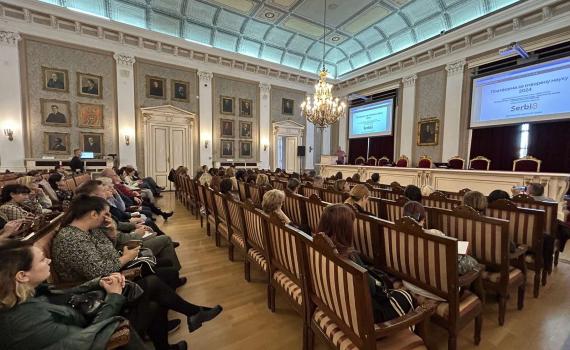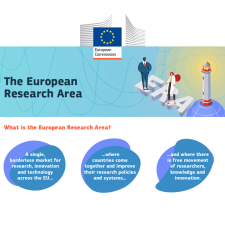
The Open Science Day V (5 November 2024) revealed an interesting new trend in advancing open science in Serbia, writes Milica Ševkušić, Project Coordinator for the EIFL Open Access Programme, who was one of the presenters at the event.
The University of Belgrade hosted the fifth edition of the Open Science Day, which has become an important event for the Serbian research community. The event is held every two years to promote the principles of open science, and brings together researchers, librarians and policy makers to discuss Serbia's progress in adopting open science principles.
Presentations at Open Science Day V revealed an interesting new trend in Serbia. In past Open Science Day conferences, presentations were generally about the work of institutions involved in major international open science projects, and these projects were the drivers of community action. This year, it seems that the community has taken the lead. Just one institution presented a large project. All the other presentations were about small open science pilot projects and actions led by small groups of librarians and researchers, and supported with expert support (consultancy) provided by major EU-funded projects, for example, FAIR-Impact and EOSC Future, or with small grants cascaded from EU projects.
The majority of the presentations were about projects and actions related to specific aspects of research data management (RDM) and FAIR (Findable, Accessible, Interoperable, Reusable) principles, for example, developing open science policy templates and FAIR practices for institutions, improving repositories, rewarding good practices in open science, and open science training. These small projects and actions are contributing to advances in open science nationally, and - through their connection to EU-funded projects - to international open science initiatives.
The conference created space for discussion about the advantages of collaborating on small-scale actions - and there was general agreement that applications for support for smaller projects and actions are easier to prepare and manage; they still engage a broad community, and they are quicker to yield results, which encourages others to try.
The conference sessions also showcased the activities of the Open Science Community Serbia (an informal initiative promoting good open science practices and facilitating cooperation and knowledge exchange between researchers and librarians) and collaborations with the ABRIR and FORRT communities. The launch of the Serbian Reproducibility Network, supported by the EU-funded TIER2 grant, was announced.
EIFL is a partner in the EU-funded project, DIAMAS (Developing Institutional Open Access Publishing Models to Advance Scholarly Communication), and I gave a presentation on the achieved and planned results of this project. Although no institutions from Serbia are involved in this project, the Serbian Diamond OA publishers can benefit from DIAMAS project resources and actions.
NEW DRAFT OF NATIONAL OPEN SCIENCE POLICY DISCUSSED
The new draft of the national open science policy was presented. I am a member of the Team for Open Science in Serbia (TONuS), which was established by the Ministry of Science, Technological Development and Innovation to develop the new national policy. The current national policy, the Open Science Platform that was adopted in 2018, established an open access mandate for publications and recommended open access to research data. The new draft policy expands the scope of the Open Science Platform: for example, if adopted, it would mandate DMPs (Data Management Plans) for publicly-funded research projects, and the use of digital identifiers (DOIs for publications; ORCID iDs for authors); it recommends the adoption of best practices relating to free and open-source software and hardware created during the research process, transparent access to research infrastructure and open science training.
Though the reception of the draft was generally positive, three issues sparked significant discussion: the requirement that authors retain the rights necessary to ensure open access to their works via a repository (because researchers are afraid that commercial publishers would object to this); resources and support for RDM (the main concern was the limited availability of trusted repositories for sensitive data and the lack of trained professionals who could support RDM processes), and transparent access to research infrastructure via a national research infrastructure registry (management of maintenance costs when equipment is shared can be problematic, and some institutions are reluctant to allow other institutions access to their publicly-funded infrastructure).
The closing panel discussion addressed the sustainability of Serbia's repository network, which has grown substantially over the past decade. This decentralized infrastructure, developed without central coordination or funding, faces challenges such as a lack of funding, limited technical resources, and the unavailability of skilled IT staff. Panelists, including the representatives of the Ministry of Science, Technological Development and Innovation and major infrastructure providers, stressed the need for systemic support. As a result of this discussion, the panel participants are now starting an initiative to establish a task force with the Ministry to develop a strategy for the sustainable development of a national repository network.
A COMMUNITY EVENT
The 2024 Open Science Day was organized by the research community without a dedicated budget and support from a major project. The venue was generously provided by the Rector’s Office of the University of Belgrade, the University of Belgrade Computer Centre provided snacks and refreshments, and participants could also enjoy crowdsourced poppy seed rolls and drinks. As always, the event was marked by positive energy, engaging discussions, and good ideas for future actions.
BACKGROUND
The first edition of the Open Science Day in Serbia was held in 2016 as an OpenAIRE national workshop. The event is now held biennially, The event is now organized biennially by the OpenAIRE NOAD (National Open Access Desk) in Serbia, attracting an engaged audience, and for many, the event has served as their first introduction to the principles and practices of open science. EIFL took part in 2016, 2018, 2022 and 2024 editions of the Serbian Open Science Day. See the 2024 agenda (in Serbian).
SHARE / PRINT







